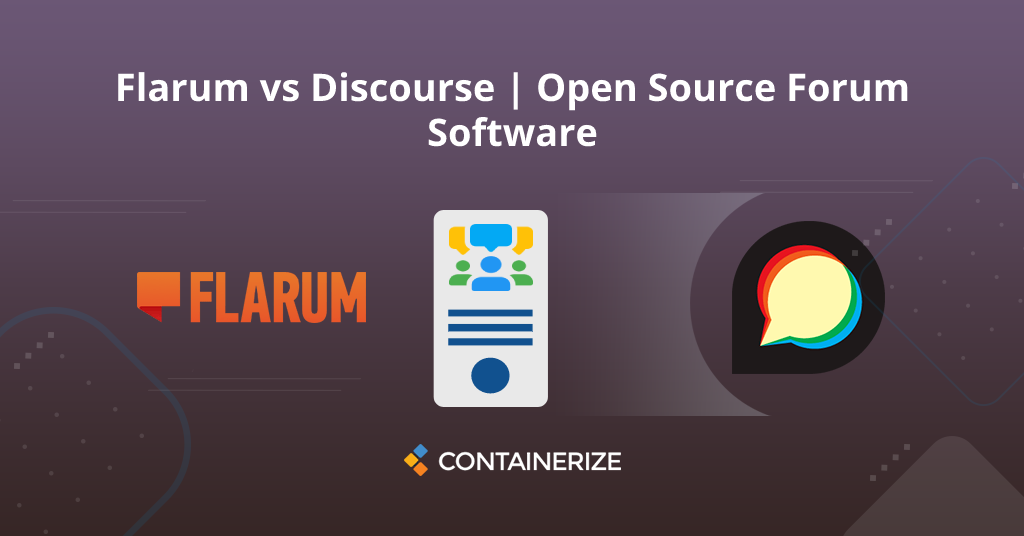Next-generation open source forum software that offers quick & extendable space for online discussions. Let’s compare the usage of Flarum and Discourse.

Overview
Welcome to our new blog post in the series of Discussion Forum Software. In the near past, we have published articles on topics such as How to Integrate Discourse Forum with WordPress, How to Integrate Discourse Forum with WordPress, and some others. However, we are going to draw a comparison between to most popular and widely used discussion forums Flarum vs Discourse. Due to a massive change in lifestyles, the online presence of individuals and businesses has become indispensable. Either the education department or the business sector, both are strongly dependent on the question-answer forum.
Open source community has developed many enterprise-level discussion forums. Discourse and Flarum are open source forum software that help businesses manage organization-wide discussions among team members and consumers. In addition, it is highly important to keep your customers engaged, gather information to address business opportunities and threats. Among other features, these discussion forums offer social features just like Facebook and Twitter that eventually help businesses grow business communities in a modern way. However, this blog post will comprise the following points.
What is Discourse? {#What-is-Discourse?}
Discourse is an open source forum software that provides a rich-featured portal where business entities can establish healthy discussions. Among other features, this discussion forum offers social features just like Facebook and Twitter that eventually help businesses grow business communities in a modern way. Further, there are facilities to chat with other members in the chat rooms, where you can mention people and share the media files. Further, it is written in Ruby on Rails, Ember.js, PostgreSQL, Redis and is easy to set up on your own premises.
There is a very vibrant community that offers support for this question-answer forum. There is a huge stack of plugins and themes available such as OAuth 2.0 & OpenID Connect Support, SAML Authentication, Discourse Translator, and many more. Discourse provides many features that include a dynamic notifications system, automatically expanding links, single sign-on, comprehensive API, and more. Above all, there is comprehensive documentation available regarding development and deployment. Therefore, all the source code of this open source forum software is available on Github.
Brief introduction of Flarum
Flarum is another popular discussion forum that is free, open source, and comes with self-hosting capabilities. It is highly extensible and comes with a responsive layout that works well on tablets and mobile devices too. This open source forum software is written in PHP and easy to self-host on its own servers. In addition, it provides a logical two-Pane Interface where users navigate through elements easily.
This question-answer forum is fast, reliable, lightweight, and offers many attractive features such as notification system, social features(e.g. mention, tagging, like) powerful permissions, fine-grained settings, and more. There are rich animations and themes where users can swipe left & right to view further chat controls. Just like Discourse, Flarum also has a community that is proactive and provides support for bugs and new feature requests. Above all, there is comprehensive documentation available regarding development and deployment. Therefore, all the source code of this open source forum software is available on Github.
Flarum vs Discourse
In this section, we will put both of these open source forum software in one place where we will be able to compare Discourse and Flarum.
Community
Well, both of these free question-answer forums have strong communities that actively respond to the user/developers’ queries. If we talk about the Github stats, Flarum has 12k plus stars and 1k forks on its Github repo. On the other side, Discourse has 34k plus stars and 7k plus forks on its Github repo.
Tech Stack
As far as the tech-stack of these open source forum software are concerned, Discourse is written in Ruby on Rails and JavaScript. Whereas, the Flarum is written in PHP with the combination of and MySQL / MariaDB.
Features
This is the most critical aspect when it comes to the selection of any software for your business. Therefore, both of these discussion forum software provide enterprise-level features. The Falrum and the Discourse both offer social features and rich notification systems. In addition, Discourse has a huge plugins base where you can find almost all types of plugins. Moreover, users can modify the look & feel of the Discourse dashboard. It also offers single sign-on features where users can log in using third-party social logins.
Extensibility
This is another important characteristic of any software. Fortunately, both of these open source forum software are extensible and developers can easily extend the functionality as per needs. Above all, Discourse offers AP for third-party integrations.
Conclusion
This brings up to the end of this Flarum vs Discourse. We have gone through the review of the top leading open source discussion forums. We went through what is Discourse & a brief intro of Flarum software. Both of these free software are competent and help businesses to have a professional discussion portal. Therefore, it is up to you now to conclude which discussion software fits your business model. This blog post can really help you if you are looking to deploy an open source forum software for your business. Further, there are some other blog posts that are very relevant and can find further open source forum software other than Flarum and Discourse.
Finally, containerize.com is continuously writing blog posts on further open source products and topics. Therefore, please stay in touch with the Discussion Forum Software category for regular updates. Moreover, you can follow us on our social media accounts Facebook, LinkedIn, and Twitter.
Explore
You may find the following links relevant: